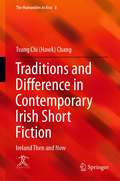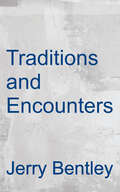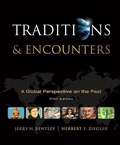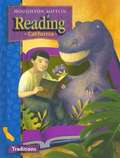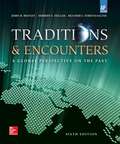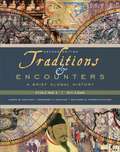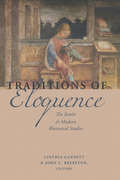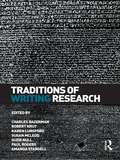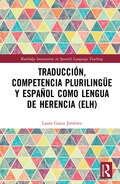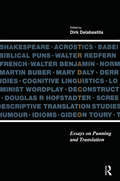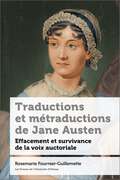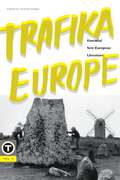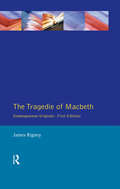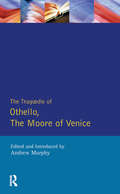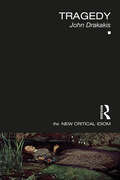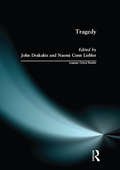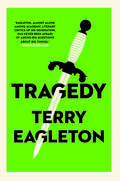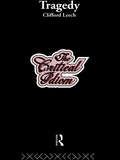- Table View
- List View
Traditions and Difference in Contemporary Irish Short Fiction: Ireland Then and Now (The Humanities in Asia #8)
by Tsung Chi ChangThis book focuses on traditions and transformations in contemporary Irish short fiction, covering pivotal issues such as gender, sexuality, abortion, the body, nostalgia, identity, and migration. In separate chapters, it introduces readers to important writers such as Maeve Binchy, Colm Tóibín, Edna O’Brien, Emma Donoghue, Gish Jen, and Donal Ryan. Given its focus, the book benefits researchers and students who are interested in Irish literature and culture, especially those who want to learn about important traditions in Irish literature, the changing face of these conventions, and the implications. The book, which received the First Book Prize 2019 awarded by The Hong Kong Academy of the Humanities, offers a unique window on Irish culture and a good read for fans of these acclaimed writers who want to learn about interesting issues concerning their short fiction.
Traditions and Encounters: A Global Perspective on the Past
by Jerry H. Bentley Herbert F. ZieglerThis book offers a global perspective on the past--a vision of history that is meaningful and appropriate for the interdependent world of contemporary times.
Traditions and Encounters: A Global Perspective on the Past
by Jerry H. Bentley Herbert F. Ziegler Heather Streets-SalterTraditions & Encounters offers an inclusive vision of the global past—one that is meaningful and appropriate for the interdependent world of contemporary times. Given the diversity of human societies gathering and organizing the sheer mass of information in a meaningful way is a daunting challenge for any world history survey course. The seven-part chronological organization enables students to understand the development of the world through time while also exploring broader big-picture thematic issues in world history. <p><p>Through new and revised chapter-level and part-level features the hallmark twin themes of traditions and encounters emerge in greater clarity than ever before in this sixth edition. As a result students have resources that enable them to move beyond the facts of history and examine the past critically analyze causes and effects and recognize similarities and differences across world regions and time periods. By digging deeper into the implications of world history’s stories—not just the who the what and the where but also the why and the how—students can make sense of the human past.
Traditions and Encounters: A Global Perspective on the Past (5th Edition)
by Herbert F. Ziegler Jerry H. BentleyConnect students to the stories of history. Connect students to the experience of history. Connect students to success in history. At McGraw-Hill, we have dedicated the past few years to deepening our understanding of student and instructor experience. Employing a wide array of research tools including surveys, focus groups, and ethnographic studies, we've identified areas in need of improvement to provide an opportunity for greater learning and teaching experiences. The fifth edition of Traditions & Encounters is a result of this. Traditions & Encounters also has a rich history of firsts: the first world history text to take a truly global perspective on the past; the first to emphasize connections among cultures; the first to combine twin themes with a seven-part framework, making the huge story of world history more manageable to both teach and learn. Now Traditions & Encounters becomes the first truly interactive world history program: one that marries groundbreaking adaptive diagnostics and interactivities with a captivating narrative and engaging visuals, creating a unique learning environment that propels greater student success and better course results. Instructors gain insight into students' engagement and understanding as students develop a base of knowledge and construct critical thinking skills. Chapter-opening vignettes and a lively narrative keep students turning the page while the adaptive questioning for each chapter and the personalized study plan for each individual student help students prepare for class discussions and course work. With its hallmark of twin themes, Traditions & Encounters continues to tell the story of the cultures and interactions that have shaped world history, while adding redesigned maps, new primary sources, and new chapter- and part-level features that strengthen connections and prompt students to analyze the events and themes in order to build a greater understanding of the past and an appreciation of history's influence on the present. Students are no longer simply reading; they are reading, interacting, and engaging in a visual, auditory, and hands-on learning experience. Give students an experience. Improve course participation and performance. Experience Traditions & Encounters, and experience success.
Traditions (California)
by J. David Cooper John J. Pikulski Patricia A. AckermanNIMAC-sourced textbook
Traditions & Encounters: A Global Perspective on the Past (Sixth Edition)
by Jerry H. Bentley Herbert F. Ziegler Heather Streets-SalterConnect students to the stories of history. Connect students to the experience of history. Connect students to success in history. At McGraw-Hill, we have dedicated the past few years to deepening our understanding of student and instructor experience. Employing a wide array of research tools including surveys, focus groups, and ethnographic studies, we've identified areas in need of improvement to provide an opportunity for greater learning and teaching experiences. The fifth edition of Traditions & Encounters is a result of this. Traditions & Encounters also has a rich history of firsts: the first world history text to take a truly global perspective on the past; the first to emphasize connections among cultures; the first to combine twin themes with a seven-part framework, making the huge story of world history more manageable to both teach and learn. Now Traditions & Encounters becomes the first truly interactive world history program: one that marries groundbreaking adaptive diagnostics and interactivities with a captivating narrative and engaging visuals, creating a unique learning environment that propels greater student success and better course results. Instructors gain insight into students' engagement and understanding as students develop a base of knowledge and construct critical thinking skills. Chapter-opening vignettes and a lively narrative keep students turning the page while the adaptive questioning for each chapter and the personalized study plan for each individual student help students prepare for class discussions and course work. With its hallmark of twin themes,Traditions & Encounters continues to tell the story of the cultures and interactions that have shaped world history, while adding redesigned maps, new primary sources, and new chapter- and part-level features that strengthen connections and prompt students to analyze the events and themes in order to build a greater understanding of the past and an appreciation of history's influence on the present. Students are no longer simply reading; they are reading, interacting, and engaging in a visual, auditory, and hands-on learning experience. Give students an experience. Improve course participation and performance. Experience Traditions & Encounters, and experience success.
Traditions & Encounters: Global Perspective On The Past (AP Traditions And Encounters)
by Jerry H. Bentley Herbert F. Ziegler Heather Streets-SalterNIMAC-sourced textbook
Traditions & Encounters: A Brief Global History, Volume I (2nd edition)
by Heather Streets Salter Herbert F. Ziegler Jerry H. BentleyBased on Bentley and Ziegler's best-selling, comprehensive survey text, Traditions & Encounters: A Brief Global History provides a streamlined account of the cultures and interactions that have shaped world history. An effective part structure organizes developments into seven eras of global history, putting events into perspective and creating a framework for cross-cultural comparisons, while the strong themes of traditions (the formations and development of the world's major societies) and encounters (cross-cultural interactions and exchanges) bring focus to the human experience and help turn the giant story of world history into something more manageable. With an engaging narrative, visual appeal, extended pedagogy, and a strong emphasis on critical thinking, this concise version offers enhanced flexibility and affordability without sacrificing the features that have made the complete text a favorite among instructors and students alike.
Traditions In Literature
by Helen Mcdonnell James E. Miller Russell J. HoganTraditions in Literature has four units containing short stories, poems, and nonfiction selections. Two units contain plays, one having three modern dramas and the other Julius Caesar by Shakespeare. Another unit is made up of Arthurian legends, and the eighth unit consists of two novels, The Pearl and Master and Man.
Traditions of Eloquence: The Jesuits and Modern Rhetorical Studies
by Cinthia Gannett and John C. BreretonThis groundbreaking collection explores the important ways Jesuits have employed rhetoric, the ancient art of persuasion and the current art of communications, from the sixteenth century to the present. Much of the history of how Jesuit traditions contributed to the development of rhetorical theory and pedagogy has been lost, effaced, or dispersed. As a result, those interested in Jesuit education and higher education in the United States, as well as scholars and teachers of rhetoric, are often unaware of this living 450-year-old tradition. Written by highly regarded scholars of rhetoric, composition, education, philosophy, and history, many based at Jesuit colleges and universities, the essays in this volume explore the tradition of Jesuit rhetorical education—that is, constructing “a more usable past” and a viable future for eloquentia perfecta, the Jesuits’ chief aim for the liberal arts. Intended to foster eloquence across the curriculum and into the world beyond, Jesuit rhetoric integrates intellectual rigor, broad knowledge, civic action, and spiritual discernment as the chief goals of the educational experience.Consummate scholars and rhetors, the early Jesuits employed all the intellectual and language arts as “contemplatives in action,” preaching and undertaking missionary, educational, and charitable works in the world. The study, pedagogy, and practice of classical grammar and rhetoric, adapted to Christian humanism, naturally provided a central focus of this powerful educational system as part of the Jesuit commitment to the Ministries of the Word. This book traces the development of Jesuit rhetoric in Renaissance Europe, follows its expansion to the United States, and documents its reemergence on campuses and in scholarly discussions across America in the twenty-first century.Traditions of Eloquence provides a wellspring of insight into the past, present, and future of Jesuit rhetorical traditions. In a period of ongoing reformulations and applications of Jesuit educational mission and identity, this collection of compelling essays helps provide historical context, a sense of continuity in current practice, and a platform for creating future curricula and pedagogy. Moreover it is a valuable resource for anyone interested in understanding a core aspect of the Jesuit educational heritage.
Traditions of Writing Research
by Bazerman Charles Krut Robert Lunsford Karen McLeod Susan Null Suzie Rogers Paul Amanda StansellTraditions of Writing Research reflects the different styles of work offered at the Writing Research Across Borders conference. Organized by Charles Bazerman, one of the pre-eminent scholars in writing studies, the conference facilitated an unprecedented gathering of writing researchers. Representing the best of the works presented, this collection focuses solely on writing research, in its lifespan scope bringing together writing researchers interested in early childhood through adult writing practices. It brings together differing research traditions, and offers a broad international scope, with contributor-presenters including top international researchers in the field The volume's opening section presents writing research agendas from different regions and research groups. The next section addresses the national, political, and historical contexts that shape educational institutions and the writing initiatives developed there. The following sections represent a wide range of research approaches for investigating writing processes and practices in primary, secondary, and higher education. The volume ends with theoretical and methodological reflections. This exemplary collection, like the conference that it grew out of, will bring new perspectives to the rich dialogue of contemporary research on writing and advance understanding of this complex and important human activity.
Traducción, competencia plurilingüe y español como lengua de herencia (Routledge Innovations in Spanish Language Teaching)
by Laura Gasca JiménezTraducción, competencia plurilingüe y español como lengua de herencia (ELH) explora las conexiones entre la ensenanza del ELH y la competencia traductora. En el libro se identifican estrategias para que las experiencias y practicas linguisticas de los estudiantes del espanol como lengua de herencia se vean representadas en el contexto de la formacion profesional de traduccion e interpretacion. Basado en un estudio empirico con estudiantes universitarios, esta monografia ofrece pautas para fomentar el desarrollo de habilidades de traduccion a partir de tres dimensiones principales: como estrategia plurilingue, actividad pedagogica y destreza profesional. Por su caracter introductorio, este libro es de particular interes para profesores e investigadores del ELH que buscan integrar de manera sistematica la practica de la traduccion en sus actividades docentes. Asimismo, los profesores de traduccion e interpretacion que deseen aprender como potenciar la mediacion como componente de aprendizaje en las habilidades de traduccion e interpretacion encontraran en esta obra numerosas sugerencias para conseguirlo. Traducción, competencia plurilingüe y español como lengua de herencia (ELH) explores the connections between Spanish heritage language (SHL) education and translation competence. The volume identifies strategies to represent the linguistic experiences and practices of SHL students in the context of professional translation and interpreting training. Based on an empirical study with undergraduate students, this monograph provides insight on how to develop translation skills in three ways: as a plurilingual strategy, a pedagogical activity, and a professional skill. Because of its introductory nature, this book is of particular interest to SHL teachers and researchers seeking to systematically integrate translation practice into their teaching. Likewise, teachers of translation and interpreting who wish to learn how to enhance mediation as a learning component in translation and interpreting skills will find numerous suggestions on how to do so in this volume.
Traductio: Essays on Punning and Translation
by Dirk DelabastitaNothing like wordplay can make difference between languages look so uncompromising, can give such a sharp edge to the dilemma between forms and effects, can so blur the line between translation and adaptation, or can cast such harsh light on our illusion of complete semantic stability. In the pun the whole language system may resonate, and so may literary traditions and ideological discourses. It follows that the pun does not only put translators to the test, it also poses a challenge to the views and concepts of those who study translation. This book brings together experts on translation and the pun, as well as researchers representing a variety of other relevant disciplines and schools of thought, ranging from theology to deconstruction and from contrastive linguistics to feminism. It can be read as a companion volume to Wordplay and Translation, a special issue of The Translator (Volume 2, Number 2, 1996), also edited by Dirk Delabastita
Traductions et métraductions de Jane Austen: Effacement et survivance de la voix auctoriale (Regards sur la traduction)
by Rosemarie Fournier-GuillemetteLa réputation de l’autrice britannique Jane Austen, particulièrement dans le monde anglophone, n’est plus à faire : son œuvre est abondamment fréquentée par les lecteurs et lectrices, et l’on ne compte plus les adaptations et continuations – textuelles et transmédiatiques – de ses romans. En français seulement, ses ouvrages ont été l’objet de plus de 70 traductions en deux siècles d’existence.Comment son écriture, où abondent humour, ironie et discours indirect libre, a-t-elle été intégrée au corpus français ? Alors qu’Austen fait déjà l’objet de débats dans le monde anglo-saxon, quelle interprétation aura franchi la Manche et été proposée au lectorat francophone ? Ce transfert linguistique aura-t-il, pour l’autrice, donné lieu à une traduction ou à une métraduction ?Analyse littéraire combinant les disciplines de la traductologie, la narratologie et des études féministes, ce livre se penche, avec une approche diachronique, sur les traductions françaises de trois romans de Jane Austen : Northanger Abbey (1803 [†1818]), Pride and Prejudice (1813) et Persuasion (†1818).Dans cette étude traductologique et littéraire des versions françaises des romans de Jane Austen, Rosemarie Fournier-Guillemette s’intéresse aux destinées françaises des prises de position et de l’écriture de cette autrice qui a inspiré de nombreuses féministes par sa critique de l’institution du mariage.
Trafika Europe: Essential New European Literature, Vol. 1
by Andrew SingerIn volume 1 of Trafika Europe, Andrew Singer gathers choice offerings from the first year of the quarterly journal of the same name. These fourteen selections—from seven women and seven men, seven poets and seven fiction writers—represent languages across the Continent, from Shetland Scots and Occitan, Latvian and Polish, Armenian, Italian, Hungarian, German, and Slovenian to Faroese and Icelandic. With some of the most accomplished writing in new translation from Europe today, this volume opens a window onto some emerging contours of European identity. Former ASCAP director of photography Mark Chester complements the writing with sumptuous black-and-white photos.The contributors are Vincenzo Bagnoli, Ewa Chrusciel, Christine DeLuca, Mandy Haggith, Stefanie Kremser, Aurélia Lassaque, Wiesław Myśliwski, Jóanes Nielsen, Edvīns Raups, László Sárközi, Marko Sosič, Jón Kalman Stefánsson, Nara Vardanyan, and Māra Zālīte.
Trafika Europe: Essential New European Literature, Vol. 1
by Andrew SingerIn volume 1 of Trafika Europe, Andrew Singer gathers choice offerings from the first year of the quarterly journal of the same name. These fourteen selections—from seven women and seven men, seven poets and seven fiction writers—represent languages across the Continent, from Shetland Scots and Occitan, Latvian and Polish, Armenian, Italian, Hungarian, German, and Slovenian to Faroese and Icelandic. With some of the most accomplished writing in new translation from Europe today, this volume opens a window onto some emerging contours of European identity. Former ASCAP director of photography Mark Chester complements the writing with sumptuous black-and-white photos.The contributors are Vincenzo Bagnoli, Ewa Chrusciel, Christine DeLuca, Mandy Haggith, Stefanie Kremser, Aurélia Lassaque, Wiesław Myśliwski, Jóanes Nielsen, Edvīns Raups, László Sárközi, Marko Sosič, Jón Kalman Stefánsson, Nara Vardanyan, and Māra Zālīte.
The Tragedie of Macbeth: The Folio of 1623 (Timeless Shakespeare)
by James RigneyThe Shakespearean Originals Series takes as its point of departure the question: "What is it that we read Shakespeare?" The answer may seem self-evident: we read the words that Shakespeare wrote. But do we? In the case of all the major editions of Shakespeare available in the market, the fact of the matter is that many of the words that we read in an edition of, say, Hamlet, never appeared in the text as it was printed during or shortly after Shakespeare's own lifetime. They are the interpetations and interpolations of a series of editors who have been systematically changing Shakespeare's text from the eighteenth century onwards. This volume offers the text of Macbeth, as printed in the 1623 First Folio.
The Tragedie of Othello, the Moore of Venice
by William ShakespeareThe "Shakespearean Originals" series aims to provide readers of modern drama with 16th- and 17th-century playtexts which have been treated as historical documents, and are reproduced as closely to their original printed forms as the conditions of modern publication will permit. Each volume in the series comprises a general series introduction, an introduction to the play, the original text, a select bibliography, full annotations and some sample facsimile pages from the text itself.
Tragedy (The New Critical Idiom)
by John DrakakisTragedy is one of the oldest and most resilient forms of narrative. Considering texts from ancient Greece to the present day, this comprehensive introduction shows how tragedy has been re-imagined and redefined throughout Western cultural history. Tragedy offers a concise history of tragedy tracing its evolution through key plays, prose, poetry and philosophical dimensions. John Drakakis examines a wealth of popular plays, including works from the ancient Greeks, Shakespeare, Bertolt Brecht, Sarah Kane and Tom Stoppard. He also considers the rewriting and appropriating of ancient drama though a wide range of authors, such as Chaucer, George Eliot, Ted Hughes and Colm Tóibín. Drakakis also demystifies complex philosophical interpretations of tragedy, including those of Hegel, Kierkegaard, Nietzsche and Benjamin. This accessible resource is an invaluable guide for anyone studying tragedy in literature or theatre studies.
Tragedy (Longman Critical Readers)
by John Drakakis Naomi Conn LieblerThis wide-ranging and unique collection of documents on one of the most enduring of literary genres, Tragedy, offers a radical revaluation of its significance in the light of the critical attention that it has received during the past one-hundred and fifty years. The foundations of much contemporary thinking about Tragedy are to be found in the writings of Hegel, Nietzsche, and Kierkegaard; in addition, the dialectical tradition emanating from Marxism, and the psycho-analytical writings of Freud, have extended significantly the horizons of the subject. With the explosion of interest in the areas of post-structuralism, sociology of culture, social anthropology, feminism, deconstruction, and the study of ritual, new questions are being asked about this persistent artistic exploration of human experience. This book seeks to represent a full selection of these divergent interests, in a series of substantial extracts which display the continuing richness of the debate about a genre which has provoked, and challenged categorical discussion since the appearance of Aristotle's Poetics.
Tragedy: Religion, Ideology And Power In The Drama Of Shakespeare And His Contemporaries
by Terry EagletonA new account of tragedy and its fundamental position in Western culture In this compelling account, eminent literary critic Terry Eagleton explores the nuances of tragedy in Western culture—from literature and politics to philosophy and theater. Eagleton covers a vast array of thinkers and practitioners, including Nietzsche, Walter Benjamin, and Slavoj Žižek, as well as key figures in theater, from Sophocles and Aeschylus to Shakespeare and Ibsen. Eagleton examines the political nature of tragedy, looking closely at its connection with periods of historical transition. The dramatic form originated not as a meditation on the human condition, but at moments of political engagement, when civilizations struggled with the conflicts that beset them. Tragedy, Eagleton demonstrates, is fundamental to human experience and culture.
Tragedy (The\critical Idiom Reissued Ser. #1)
by Clifford LeechProfessor Leech considers the significance of the term ‘Tragedy’ as it has been used from classical times to the present day. He gives examples of tragic writing from a wide variety of dramatic literatures and relates theoretical writings on tragedy and the tragedies that have been contemporaneous with them. Free reference is made to critics from Aristotle to these of the present. Special stress is laid on the tragedies of the Greeks, of Renaissance writers and of our immediate contemporaries, notably Harold Pinter and Tom Stoppard. There is also discussion of tragic writing in the modern novel.

